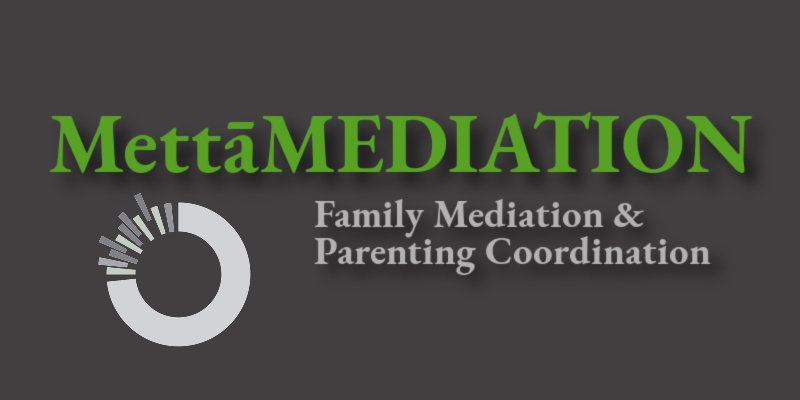
Family Mediation
This is a voluntary process designed to assist parties dealing with post-separation issues to resolve them through dialogue and consensus.
Below are typical steps taken by a couple hoping to resolve their dispute with the assistance of family mediation.
Mandatory steps are marked with *.
Parties come to an understanding that they want to try family mediation to resolve their dispute(s)*
Mediation is a voluntary process. For this reason, neither party can be forced to participate in it. Parties can engage in family mediation only when they decide -JOINTLY - to do so. This agreement between them does not have to be in writing but there must be commonality of intention, a communication between the parties about proceeding to mediation (or between their respective lawyers if they are represented). The parties need to be on the same page about contacting the mediator, expressing their mutual intention to mediate, and commencing the process eventually leading to actual mediation session(s).
BOTH parties reach out to the family mediator *
Picking up on the first step (above), in order to proceed with the steps below, Carolyn Pearson (our Mediation & PC Coordinator) will need to hear from both parties that they are interested in exploring the possibility of family mediation. Each party can confirm their interest separately, either by email or call, but both have to reach out before Carolyn is able to send out our information package and proceed further.
If the parties have counsel, that first contact with our office is initiated by the lawyers, typically jointly. An email from both counsel is usually sent to Carolyn - in response to it, she provides answers to all questions posed - typically about availability and cost.
Conference call between Counsel and the Mediator
If the parties have counsel, AJ usually convenes a preliminary conference call with them to learn more about the matter, to have a basic understanding of the key issues, and to discuss the expected timing and any potential urgency involved.
During this adminitrative call, the issue of screening for power imbalance is also addressed - this screening of each party individually can be completed either by AJ, as mediator, or by each party’s lawyer. One way or another, the mediation cannot proceed until both parties are screened, and the matter is determined by the mediator to be suitable for family mediation.
During this preliminary call, AJ is also able to answer any questions the lawyers may have for her. The more planning and organizing the lawyers and the mediator can do before the actual mediation session(s), the greater the chances the mediation itself will be organized, structured, streamlined and ultimately, effective.
Screening for Power Imbalance completed*
As noted above, screening for Power Imbalance is an essential preliminary step to family mediation. It is a fundamental principle of family mediation that the parties come to the negotiating table able to bargain freely and in a self-determined way. Screening for Power Imbalance is an inquiry designed to give the mediator insight into whether there are any impediments to the mediation proceeding on that basis. This inquiry takes place one-on-one with each party, in a completely confidential setting. If the parties come to mediation without counsel, AJ completes the screening herself.
If the parties have counsel, screening by each lawyer of their client is possible, if counsel feel comfortable and competent doing so. Otherwise, counsel can elect to have AJ complete the screening.
Agreement to Mediate signed*
Once the screening is completed, and assuming the mediator determines the matter is suitable for family mediation, the parties must sign an Agreement to Mediate - this document sets out the terms on which the mediation will be proceeding, including the issues to be tackled, and the mode of the mediator’s involvement (classic or evaluative/directive). Importantly, the Agreement to Mediate confirms that the mediation will be closed, meaning completely confidential.
Mediation Briefs submitted to Mediator
If the parties have counsel, they usually submit in advance of the mediation session(s) Mediation Briefs containing an overview of the issues to be addressed, and any supporting calculations and documentation. Such Brief can be very helpful ~ they do assist the mediator in streamlining and focusing the process but are by no means mandatory.
If parties attend mediation without counsel, AJ discusses with the parties, before the first mediation session, what documentation she will require from them to understand the issues being presented to her for resolution. For example, this may include income information like Income Tax Returns, pay stubs, Notices of Assessment, etc. If the parties are negotiating any property/debt issues, they will each need to complete and swear a Financial Statement.
Mediation session(s) take place*
Depending on the number and complexity of issues to be tackled, the mediation discussion can take place in either one or in multiple sessions. The length of the sessions varies - and ranges from two hours per session to an entire day. In conducting the mediation sessions, the mediator is always sensitive to the parties’ joint and individual needs - breaks are taken as needed and the parties are able to have private time to rest and re-group.
AJ is currently conducting all of her mediations by Zoom.







